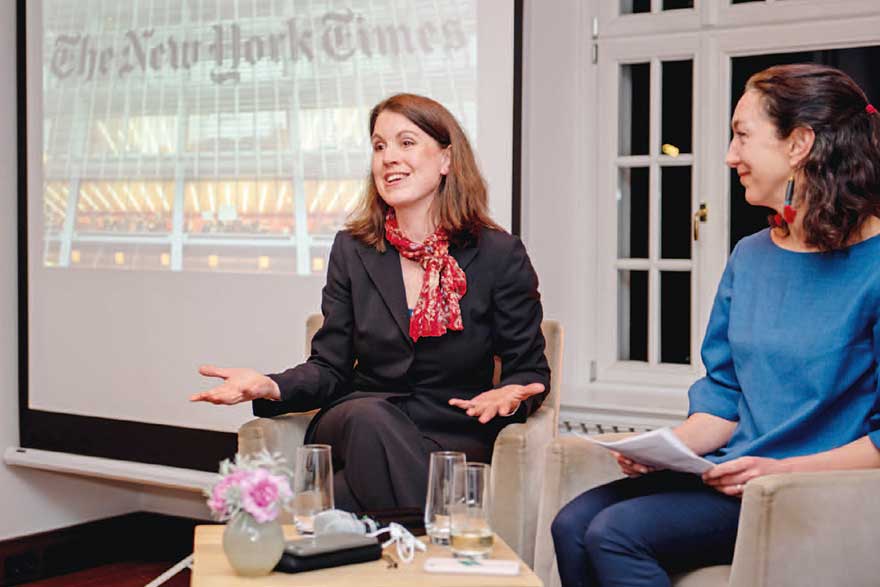The New York Times’ Berlin correspondent, Melissa Eddy, came to Business Club Hamburg to speak about her work at the paper and the challenges the media face from the “fake news” controversy.
On March 20, Business Club Hamburg hosted an evening event with Melissa Eddy of The New York Times. The evening was organised in cooperation with the RIAS Berlin Commission, a binational organization for the promotion of German-American understanding in the field of broadcasting. Amongst others, RIAS is hosting exchange programs for broadcast professionals and providing grants for radio and television productions contributing to a better knowledge about and understanding of the USA and Germany.
The Club invited her to talk about her career and her work. In the enlightening Q&A session, Jiffer Bourguignon, a Hamburgbased American who worked as an editorial assistant in SPIEGEL bureau Washington , spoke to Melissa about what brought her to Germany, what it feels like to straddle two different cultures, the role of journalism in the “post truth” world, the threat posed to the free press by Trump’s White House, the impact of US tariffs and sanctions on Europe as a whole and Germany in particular.
Melissa likened the work of a foreign correspondent to building bridges to help two cultures understand each other. Her work provides cultural and political context that readers in the US may not be familiar with and allows them to experience a side of Germany. As a long-serving correspondent, she explained that it can be difficult to maintain an outsider’s perspective, so she travels to the US frequently and keeps an ear on the ground by speaking with friends and family.
One of the recurring topics of the evening was Donald Trump, the US president who has repeatedly referred to the press as the enemy of the people. Melissa is deeply concerned about this development: “The press, which as the fourth estate provides a power balance to the White House, is being called into question with a vehemence that we have never seen before.” The New York Times has come under particular attack from the president, but Melissa pointed out that subscriber numbers spike after each broadside in a response that has been called the Trump Bump. She also put the attacks in a broader context: “Leaders around the world are taking Trump’s lead and attacking the media: it’s scary.” So how should the press cover Trump? “The NYT has at its core a mission to reporting truthfully and honestly, based on sources that we can back up. That has not and will not change.”
Other topics included trade tariffs on German cars and the potential implications for Republican voters in the swing states, the Nord Stream gas pipeline and the threat of sanctions, whether Germany should be paying more for NATO, and the implications of Huawei and the 5G network.
There was also time to look past the current White House to the 2020 election: Melissa was pleased to see that the field of candidates for 2020 includes so many women: “Now, female politicians are being talked about in terms of their policies, and not just their gender. That is a promising shift.”
The audience were able to ask questions before being invited to tour of the club premises. The evening concluded with an informal get-together with wine and food – and the welcome opportunity to chat to The New York Times’ long-standing correspondent and build even stronger bridges.
Profile
Melissa Eddy has been the Berlin Correspondent for The New York Times since January 2012. Before that, she covered Germany for The Associated Press. Melissa launched her career in journalism at the AP’s Vienna bureau in 1997. She is a native of Minnesota and holds a Master of Science in journalism from Columbia University, and a B.A. in English and French from Bucknell University. Since 2016 she has been a board member of the RIAS Berlin Commission.
